Engaged Courses Initiative Fosters Social Impact Through Community Work
The inaugural cohort of Engaged Courses unites diverse fields, communities and perspectives within the College of Arts and Sciences and beyond.
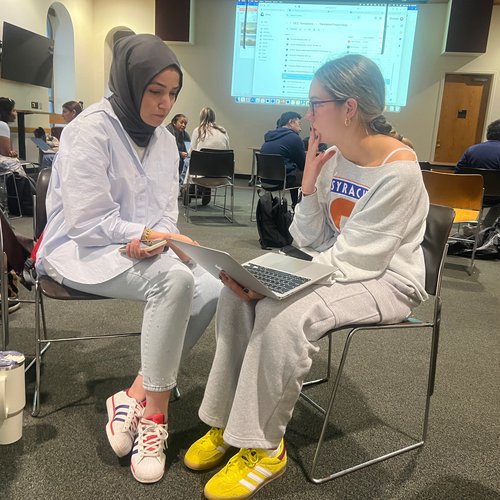
Learning opportunities that extend beyond the classroom and into the community are key for empowering students to be engaged global citizens in an ever-changing world. By becoming immersed in public work, students can develop an enhanced awareness of societal issues and practices for responding to these through collaboration. Since 2020, the College of Arts and Sciences’ (A&S’) Engaged Humanities Network (EHN) has been seeding and supporting myriad opportunities for faculty and students to foster public exchanges in their research, teaching and learning.
EHN founder Brice Nordquist, who is the Dean’s Professor of Community Engagement in A&S and a professor of writing and rhetoric, established the Engaged Communities initiative in 2021 to provide faculty, students, staff and community partners with support for publicly engaged research, programming and creative work. Building on that effort, Nordquist and his team started the Engaged Courses program this academic year (2023-24) to elevate and interconnect the work happening in new and existing A&S classes whose curriculums empower students to forge meaningful community partnerships through their coursework.
“The Engaged Communities model has worked so well in bringing collaborative research and creative teams together that we wanted to generate a similar structure for courses,” says Nordquist. “Engaged Courses presents the same cohort-based model as other EHN programs to bring faculty across departments together to share resources, exchange ideas and help invest in each other's work around community-engaged curricular design and implementation.”
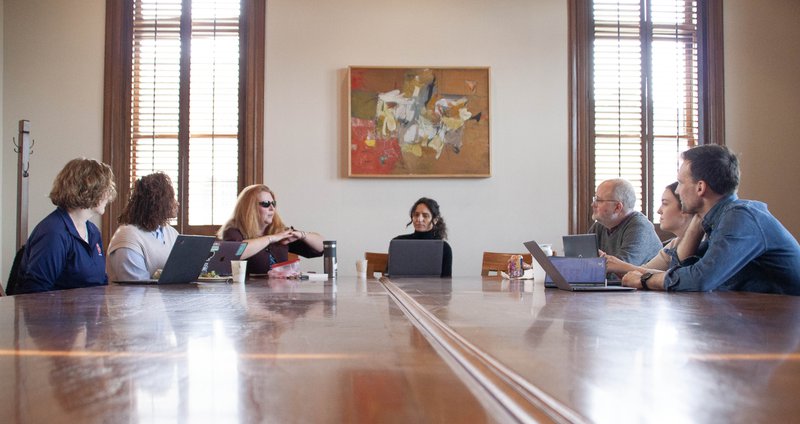
A&S faculty and staff hold an Engaged Courses cohort meeting in the Tolley Humanities Building to share information about their classes and offer mutual support.
Community-engaged work can be a challenging endeavor for faculty, due to logistical difficulties, time constraints and access to resources. This is where the Engaged Courses initiative comes in. In addition to the collaborative support from their fellow faculty in planning and sharing experiences, recipients of this grant receive funding from EHN to help with anything from supplies to food to transportation and other needs.
The inaugural cohort includes five courses, each from a different A&S department. While three of the five classes are being offered in the spring semester, two launched in fall 2023: an introductory level writing course in the Department of Writing Studies, Rhetoric and Composition, and a clinical practicum in the Department of Communication Sciences and Disorders.
Translating Cultures
Sevinç Türkkan, assistant teaching professor of writing and rhetoric, taught a course titled Introduction to Creative Non-Fiction, Writing and Translating Cultures, which connected Syracuse University students with Onondaga Community College (OCC) students of various ages, ethnicities and linguistic backgrounds who are learning English as a second language.
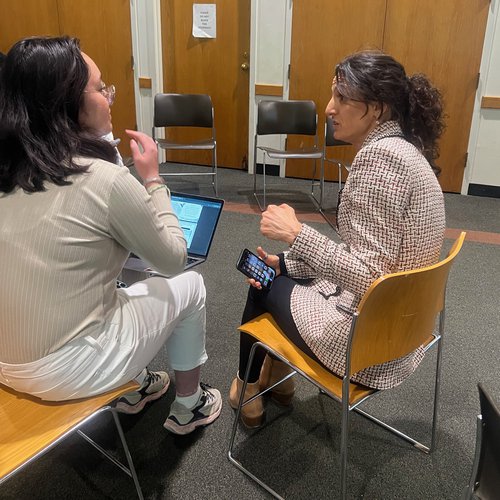
For one of the assignments, the OCC students selected, researched and translated a text of cultural significance in their native language that was not available in English. Syracuse students worked closely with them, offering feedback to help preserve the cross-cultural and cross-linguistic aspects of their English translations of these texts.
The OCC classroom consisted of students whose native languages included Arabic, Afghani, Persian-Farsi, Korean, Ukrainian, Spanish, Burmese, Chinese, Lingala, Vietnamese and Turkish. Türkkan says the goal of this exercise was not to simply render the texts into seamless English narratives, but also to maintain their bilingual flavors.
The OCC and SU students fittingly met for the first time in Hall of Languages – the visual landmark of Syracuse University whose name references the rich history of language learning that has taken place within its classrooms. Students worked together on these narratives, revising them and communicating their significance in introductions and through various visual elements. The Syracuse students also interviewed their OCC partners on topics including immigration, the refugee experience, life as an immigrant in Syracuse, and linguistic, cultural, and economic challenges. The interviews became the basis of their final projects, which were literary profiles about their peers.
One such piece, prepared by Sunny Suaya ’27, highlighted the bond she made with her partner, Yeohyun Yoon. Born in South Korea, Yoon took the class at OCC with his wife so they could improve their English language skills. He chose to translate the Korean poem, “Sky, Wind, Star and Poetry,” which was written by the poet Yoon Dong-ju during the Korean Independence movement against the Empire of Japan in the early 20th century.
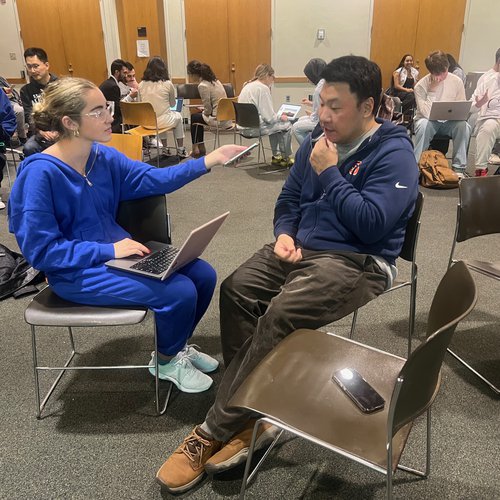
In her literary profile, Suaya explained the significance of Dong-ju’s work, which she learned about through her interaction with Yeohyun, and reflected on their newly formed relationship: “Yoon Dong-ju expressed the agony of a person during the colonial era in beautiful poetry and is considered a resistance poet who gave a ray of hope to the Korean people… As I ended my interview with Yeohyun, I felt our connection. We both were excited to be new friends and even later ate dinner together. By the end of the night, I left Yeohyun by saying ‘I am very happy to now have a close friend with someone from South Korea.’”
Türkkan notes that this type of personal cross-cultural exchange – where students bring their strengths to the table while at the same time recognizing that their community partner has complementary strengths – is a key competence of being an effective global citizen. Seeing this positive interaction play out in class is one of the more fulfilling experiences as an educator, she says.
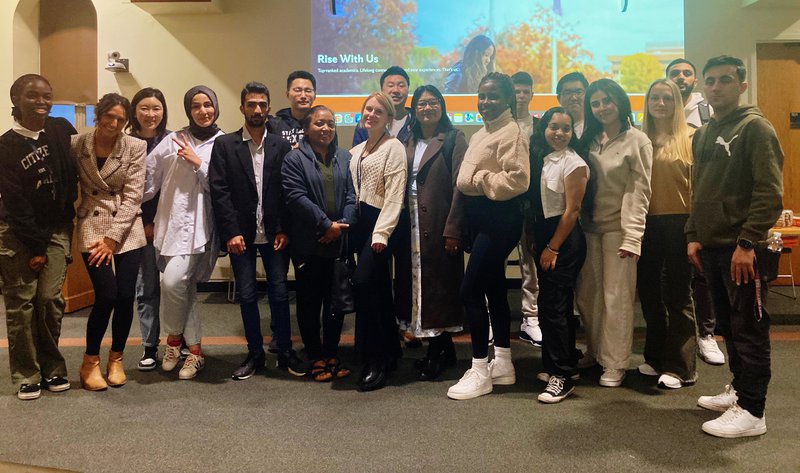
Students from Syracuse University and Onondaga Community College who worked together on the cultural text translation project, led by Professor Sevinç Türkkan (second in from the left).
“The Syracuse students learned cultural and linguistic humility when they attempted to revise a translated text whose original they could not read and had to rely on their OCC partners for a thorough understanding of how the original text signifies in its original language,” notes Türkkan. “On the other hand, my OCC students realized that they have something precious — a native language — that gave them the confidence and strength to continue to improve their English. They approached the task of learning English from a position of strength rather than from a position of insecurity and incompetence.”
While Türkkan says the financial aspect of the grant was instrumental in helping to cover such expenses as food and transportation of students between Syracuse University and Onondaga Community College, just as important was the community she built with the rest of her Engaged Courses cohort.
“Being able to share challenges and brainstorm solutions with faculty who had the same community-engaged values and were planning similar courses was above all inspirational and motivating,” she says.
Empowering Accessibility
Supporting faculty across disciplines is another important aspect of the Engaged Courses initiative. With over 300 faculty across numerous departments, interdisciplinary programs and integrated learning majors in A&S, Nordquist says he aims for each cohort to include faculty and students spanning the sciences, humanities and social sciences. Kristen Kennedy, assistant teaching professor in the Department of Communication Sciences and Disorders, applied the grant to a community-engaged project in her class, CSD 650 Clinical Practicum, which is taken every semester during students’ first three years of the four-year audiology doctorate program.
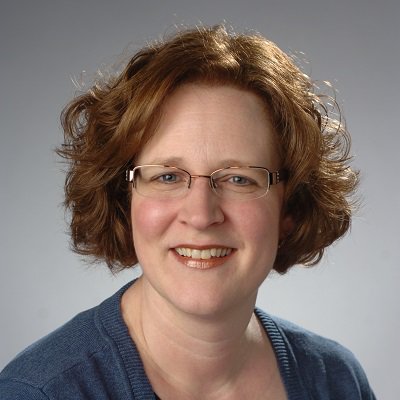
“(The practicum) is a hands-on, supervised experience working with patients in a variety of settings, including our on-campus Gebbie Speech-Language-Hearing Clinic,” says Kennedy. “The goal is for students to apply knowledge from their academic coursework into clinical practice.”
Kennedy utilized the funding to purchase six new Hearing Assistive Technology (HAT) devices for students with hearing impairment in the Syracuse City School District (SCSD). This project offered a clinical training opportunity to audiology students while also providing access to technology for hearing impaired children with diverse backgrounds in Syracuse.
Last fall, the audiology students worked with SCSD educational audiologist Lisa Guidone to identify the students in need of HAT, then instructed both the SCSD students and staff on the use and care of HAT. While this technology comes in many forms, the type they are using includes small microphones worn by teachers that wirelessly stream their voice directly to the students’ hearing aids. According to Kennedy, this technology benefits both the teacher and student as it allows each of them to move freely around the classroom. It comes in especially handy in busy, noisy settings, when background sounds can make it difficult for students who wear traditional hearing aids to hear the teacher.
“Students with hearing loss are at risk for listening fatigue, inattention, and missing critical instruction,” says Kennedy. “HAT improves the ability to hear in today’s dynamic classroom environments.”
The project will continue this spring, as Kennedy says she and students will test out how the smaller, more discreet HAT microphones compare to other devices used in past years. Their goal is to determine whether school aged students prefer the new technology.
Spring 2024 courses in this year's cohort include English Professor Roger Hallas' ENG 420: Everyday Media and Social Justice, which engages students in local communities through Family Pictures Syracuse, an inclusive, sustainable and transformative community-based project for public memory through the sharing of family photos; Languages, Literatures and Linguistics Professor Amanda Brown's LIN 300: Linguistics at Work, in which students partner with the Museum of Science and Technology (MoST) to develop exhibits that showcase in engaging and interactive audio-visual and kinesthetic ways the scientific phenomena behind language acquisition, processing and use; and Mathematics Professor Nicole Fonger's Social Justice Mathematics, which puts SU students in contact with SCSD students and teachers through collaborative social justice mathematics and mapping.
Through each of these community-engaged efforts, faculty and students in A&S are demonstrating their commitment to human thriving and experiential inquiry, key areas of distinctive excellence in the University’s Academic Strategic Plan.
Featured
Brice Nordquist Associate Professor and Dean’s Professor of Community Engagement
Sevinç Türkkan Associate Teaching Professor
Kristen Kennedy Associate Teaching Professor
